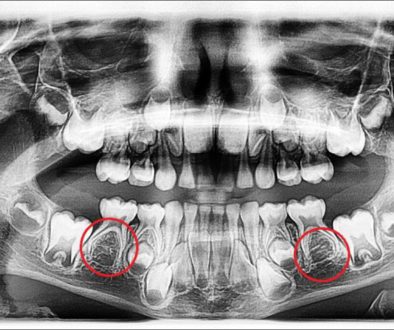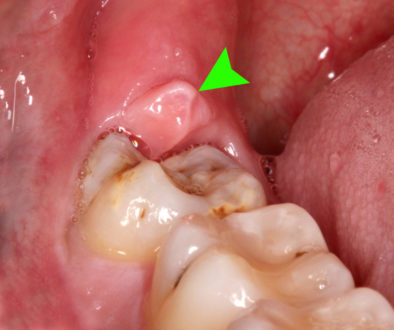Mouth Sores
 Canker Sores
Canker Sores
Canker sores (also known as ulcers) are the most common type of mouth sore for someone to get. They can be related to a variety of different triggers including…
- Trauma (such as biting your cheek or tongue)
- Crohn’s Disease
- Vitamin deficiency
- Allergies to chemicals in your toothpaste or mouthwash
- Foods especially citrus and spicy foods
- HIV
- Autoimmune diseases such as Lupus or Behcet’s Syndrome
Some people get small single ulcers, some people get a couple of large ones, and some people will develop a lot of small ones. They show up differently in every person. Some people have them show up constantly while other people only develop them once or twice a year.
Virus Related Sores
- Hand, Foot, and Mouth – This is usually a pretty easy one to figure out based on the name. If you’re infected with this virus you develop small clusters of blisters on your hands, feet, and in your mouth. You can also get the little blisters on your legs and arms as well. Most cases don’t need any treatment other than letting it run it’s course.
- Primary Herpetic Gingivostomatitis – This happens in children most often. When children are first infected with this specific type of herpes virus, they can develop a reaction to it where they get blisters and ulcers all over their lips and inside their mouth everywhere. This is another one where it needs to run it’s course. Treating the symptoms is the best you can do.
- Chicken Pox – This is much more rare to see these days as a result of the vaccine that started to be adminstered about 25 years ago. Chicken pox can cause small blisters to form all over your skin and occasionally in your mouth as well.
- Shingles – Shinges is related to the chicken pox virus (herpes zoster). The virus reactivates causing severe pain in a specific area. Mouth sores and pain are a pretty typical with shingles.
Cold Sores
- These are usually caused by the herpes virus reactivating within your nerve. They most commonly occur on or around you lips. Before you can actually see the sore, you’ll start to feel an uncomfortable or tingly feeling in the area where it is about to appear.
- If you notice it before it breaks through you can place medication on which will help reduce it’s duration. Some dentists will also use a diode laser on these areas which has also been shown to reduce the length of the outbreak.
Tooth Related Sores
- Abscess – An infected tooth cause infection to travel from the bone all the way out through your gum tissue. This will usually look like a small swollen area, similar in appearance to a pimple, and will often have some pus that comes out of it if pressed. A bad taste often accompanies this.
- Periodontal infection or abscess – You can also develop painful infections from periodontal disease that leads to ulcers or sore areas. These can look similar to an abscess from a dead toth.
- Antibiotics may make these areas go away temporarily but you need permanent treatment at a dentist when it gets to this point. Teeth where the nerve has died either need a root canal or need to be extracted. A periodontal abscess requires either scaling and root planing, periodontal surgery, or the tooth to be extracted.
Necrotizing Ulcerative Gingivitis (NUG)
People under a lot of stress will sometimes develop this condition. Dentists who work near a college or university see a lot of these cases right around the time finals comes around. The gum tissue right around their teeth becomes extremely sore and starts to break down. You can get an almost white appearance of the gums right around and in between the teeth. A lot of pain goes along with this. Your dentist will usually prescribe a chlorhexidine mouthrinse to help treat it.
Mouth Sores Associated With Dentures
If you are wearing your denture all night long, you can develop denture stomatitis underneath the denture. This happens most often with top dentures. This is usually a combination of a fungal and bacterial infection on the roof of your mouth that causes some significant irritation. Leaving your denture out at night will help to head this off.
If you have an area of your denture rubbing too hard you can develop an ulcer in that area. These usually won’t go away on their own without your denture being adjusted. This is most common with a denture that has been recently made or a denture you’ve had for a long time and no longer fits as well as it used to.
Angular Cheilitis
This is when the corners of your mouth get red, cracked, and sore. The most common causes are having few or no teeth (so your mouth closes more than usual), licking your lips, vitamin deficiency, or an infection. Most infections here are at least partially fungal related. Most dentists will prescribe an antibacterial and antifungal ointment to place on the area. In most cases this will be sufficient to solve your problem.
Sore Tongue
Your tongue can develop sore areas for a variety of reasons…
- Thrush (fungal infection) – This will appear as whitish coating on the surface of your tongue that you can rub off. Underneath it will be red and painful. This most commonly happens when you’re taking an antibiotic.
- Burned tongue from something hot
- Biting your tongue
- A sharp or broken tooth
- Vitamin deficiency (especially B vitamins)
Oral Cancer
Most other types of sores in the mouth heal within two weeks. If you have a mouth sore that isn’t healing you should have it checked out. Another warning sign that it may be oral cancer is if it doesn’t hurt. Most canker sores hurt quite a bite, especially if something touches them. Sores caused by oral cancer usually don’t hurt at all.
Strep Throat
A specific type of streptococcus bacteria can infect the tissues and tonsils at the back of the throat. This specific bacteria causes the tissues to break down leading to pain, especially while swallowing. Most doctors treat this with antibiotics.
Tonsillitis
Your throat or tonsils can become inflamed for a variety of reasons including allergies, colds, the flu, and other types of infection in the area. Most cases don’t need any treatment except for gargling with salt water and some time for your body to heal.
If you’d like to know what the best over the counter medications are for mouth sores, check out my recommendations here.



